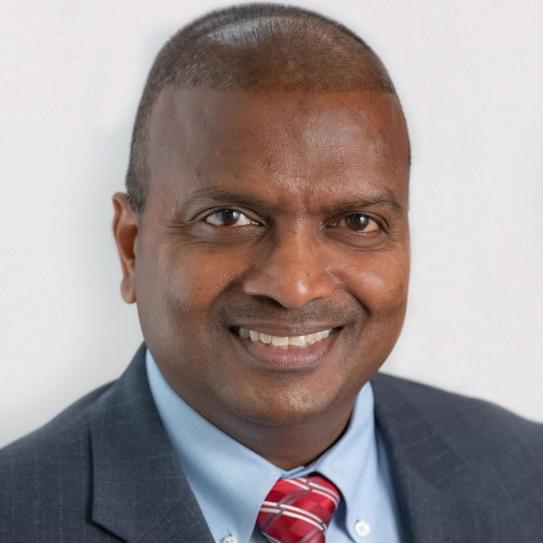Leonard Singh

It would probably take an entire book to do justice to Leonard Singh’s life and career. That volume would be a page-turner — complete with a bright, hard-working hero, inspiring characters, family bonds, and triumph over hardship.
Singh is a native of Guyana, a former British colony on the northern coast of South America. While the nation won its independence from the U.K. in 1966, the British educational system remained in place, and he won a scholarship to a highly regarded school several miles from his home. To earn the bus fare he needed to get there each day, he grew and sold vegetables.
In the early 1980s, when Singh was 12, his parents, seeking greater opportunity, immigrated to the U.S. with their five sons, settling in the Flatbush section of Brooklyn, near the aunt who had sponsored them. Despite enjoying the support of a large and warm extended family, life in New York was far from easy. Singh’s father, whom he calls “absolutely the smartest man I know,” had worked as a bookkeeper on a sugar plantation back in Guyana but was forced to earn his GED in order to find bookkeeping work in America; his mother, with no formal education and accustomed to staying home to care for her sons, now took on a series of odd jobs to help make ends meet.
With nine people — Singh, his mother, father, four brothers, and two boarders — crowded into a one-bedroom apartment, the school was a welcome respite from home, although enrolling took jumping through some bureaucratic hurdles: while Singh tested at a high school level, the city decreed that he was too young to attend Erasmus Hall with his older brother, and he was instead sent to Walt Whitman Junior High, where he ended his time as class valedictorian. (He still has his speech stashed away as a memento, he says.)
At Erasmus, which he attended next, he was valedictorian of the bicentennial graduating class, and because of his interest in science and math, an advisor suggested he consider engineering. Singh was game: he had heard American-born peers discussing a prestigious school called MIT, and, excited by the prospect of living in Massachusetts and gaining some independence, he applied. The choice to study electrical engineering, he admits, was also influenced by his friends.
After graduating with his B.S. in 1991, Singh joined a highly competitive entry-level program for new college graduates at the energy giant ConEd. The program found him working variously as a field engineer and operating supervisor at the Ravenswood Generating Station, Energy Control Center, and Manhattan Substation, among other assignments, and once his year was up, he was hired to work full-time in the Steam Operations division. It would be the first of many posts he held at the Fortune 500 company.
While happy there — and advancing steadily through the ranks — Singh was unwilling to rest on his laurels. Taking advantage of ConEd’s generous tuition-reimbursement policy, he applied to what was then known affectionately as Poly and studied part-time, in the evenings. Although he admits that it was rough to take classes and work concurrently, Singh persevered, and in 1998, he earned an M.S. in electrical engineering. (Later, in 2018, after realizing that studying business could only help his career, he earned an MBA from Columbia University.)
By the time he left ConEd, after 31 years, Singh had risen to the title of Senior Vice President of Customer Energy Solutions, a job that gave him responsibility for working with regulators and stakeholders to reshape the electric-delivery business model and integrate infrastructure planning, innovative technical options, battery storage, energy efficiency, rate design strategy, heating electrification, and electric vehicle initiatives, among other projects. (Directly prior to that he had been VP of Manhattan Electric Operations, with the staggering responsibility of providing the safe and reliable delivery of electricity to a borough with 1.6 million residences, a daily influx of 1.5 million commuters, and nearly 60 million tourists annually.)
Singh — whose volunteer posts have included the Executive Vice Presidency of the NYU-Poly Alumni Association, a seat on the Board of Directors at McBurney YMCA, and the directorship of the Salvadori Center and Knology, among others — is now the Chairman and President of Ameren Illinois. He had found it somewhat difficult to leave his longtime employer and the city he loved but realized that being at the helm of a major energy company was a logical next step in his career evolution.
“As chairman, I hope I can be a role model, maybe even to some other young girl or boy in Flatbush who loves science and math as I did,” he explains. “I’m standing on the shoulders of giants, as Isaac Newton said, and maybe I can pull someone else up as well.”
“Besides,” he concludes, “my grandparents were indentured servants forced to sail across an ocean to the unknown, and my parents got on a plane to forge a better life for their children. I was certainly not going to be afraid to grasp an opportunity of this magnitude simply because it required moving a few hundred miles.”

